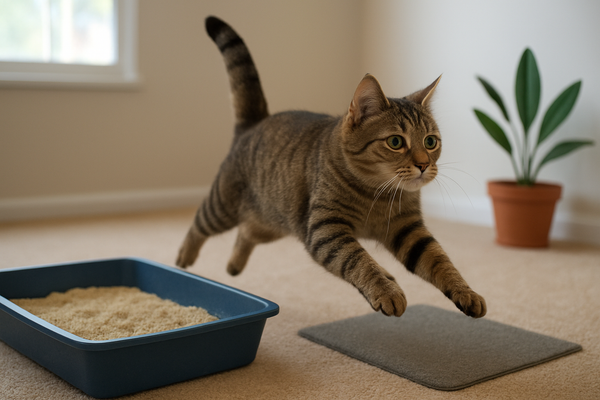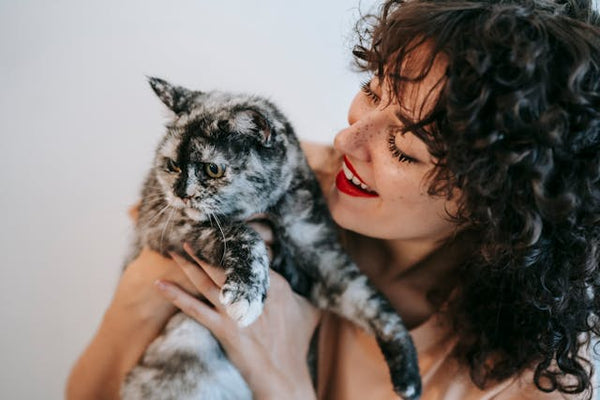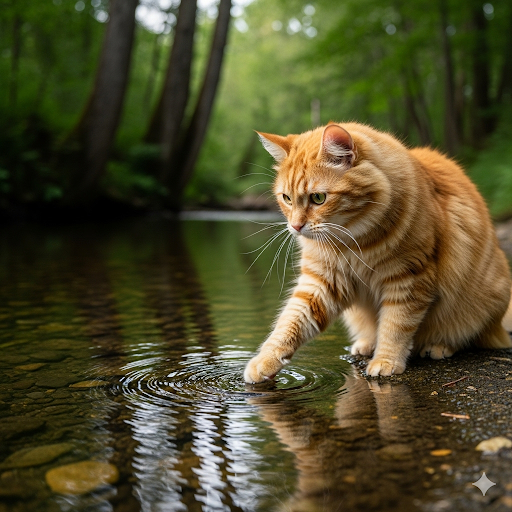
For cat parents, the purr of a contented feline is a symphony, the flick of a fluffy tail a mesmerizing dance. But there's another delightful sensory experience unique to cat ownership: the intoxicating scent of a clean cat. Unlike their canine counterparts, who often require frequent baths to maintain a pleasant odour, cats seem to possess an inbuilt fragrance factory, leaving us wondering – why do cats smell so good?
The answer, like most things feline, is a delightful interplay of biology, behavior, and perhaps even a touch of emotional connection. Let's delve into the fascinating world of feline fragrance and explore the secrets behind your cat's captivating aroma.
Cleanliness is Next to Catliness: The Power of Grooming
Cats are renowned for their meticulous grooming habits. They spend a significant portion of their waking hours – estimates range from 30% to 50% – meticulously licking and cleaning their fur. This dedication to hygiene isn't just about vanity; it's a deeply ingrained instinct rooted in their evolutionary past.
In the wild, a clean coat translates to survival. Predators rely on camouflage to catch prey, and a pungent odour can easily give them away. By keeping themselves meticulously clean, wild cats mask their scent, increasing their hunting success and reducing the risk of being detected by larger predators.
This instinct for cleanliness carries over to our domesticated felines. Their rough tongues act like tiny combs, removing dirt, debris, and loose fur. Saliva deposited during grooming not only helps flatten fur but also contains enzymes with mild antibacterial properties. This constant self-grooming keeps your cat smelling fresh and prevents the buildup of unpleasant odours.
The Science of Sebum: A Natural Fragrance Enhancer
While meticulous grooming removes dirt and debris, it also plays a crucial role in creating that pleasant feline fragrance. As cats groom themselves, they spread a natural oil called sebum onto their fur. Sebum is produced by glands at the base of hair follicles and has several functions, including waterproofing the fur, keeping it supple, and preventing dryness.
More importantly, from an olfactory standpoint, sebum contains unique fatty acids that contribute to the distinctive, often described as "bready" or "popcorn-like" scent we associate with clean cats. These fatty acids can vary slightly between individual cats, creating a personalized fragrance for your furry friend.
Diet Matters: Fueling a Pleasant Scent
Just like humans, a cat's diet can influence their overall odour. A high-quality diet rich in essential fatty acids and nutrients contributes to healthy skin and fur, which in turn translates to a pleasant scent. Conversely, a poor diet deficient in essential nutrients can lead to dull fur and a potentially unpleasant odour.
If you notice a change in your cat's usual scent, it could be a sign of dietary issues. Consulting your veterinarian and exploring food options rich in omega-3 and omega-6 fatty acids might be necessary to restore your cat's natural fragrance and overall well-being.
Beyond Biology: The Emotional Connection to Scent
The reasons why cats smell good extend beyond purely scientific explanations. Studies suggest that the scent of a familiar cat can have a calming and stress-reducing effect on their owners. This could be due to a combination of factors.
Firstly, the act of petting a cat stimulates the release of oxytocin, the "love hormone," in both humans and cats. This hormone promotes feelings of attachment and bonding. Secondly, the familiar scent of your cat might create a sense of security and comfort, similar to how a baby finds comfort in the familiar scent of their mother.
Beyond the Pleasant: Recognizing Unusual Odours
While a healthy cat generally has a pleasant scent, it's important to be aware of changes in their usual odour. A foul smell emanating from your cat could indicate underlying health issues. Here are some red flags to watch out for:
- Strong urine odour: This could be a sign of urinary tract infections, bladder stones, or diabetes.
- Fishy smell: This could indicate gum disease or other dental problems.
- Yeasty smell: This could be a sign of a yeast infection, often associated with skin problems.
If you notice any unusual odours from your cat, it's vital to schedule a visit with your veterinarian to determine the cause and receive appropriate treatment.
Maintaining Your Cat's Heavenly Scent
While cats are naturally clean creatures, there are a few things you can do to ensure they continue to smell their best:
- Regular brushing: Brushing removes loose fur, dirt, and debris, helping to maintain a healthy coat and distribute sebum evenly.
- High-quality diet: Ensure your cat receives a balanced diet rich in essential nutrients for healthy skin and fur.
- Clean litter box: A clean litter box is crucial for preventing unpleasant odours. Aim to scoop waste daily and completely change the litter box every month, depending on the type of litter and the number of cats in your household.
- Regular dental care: Just like humans, cats can develop dental issues that can lead to bad breath. Schedule regular vet checkups to ensure your cat's oral health is in good condition.
- Stress management: Cats are sensitive creatures, and stress can manifest in various ways, including changes in their scent. Providing a calm and enriching environment with plenty of hiding spots and vertical spaces can help reduce stress levels and potentially contribute to a more pleasant odour.
Embracing the Nuances: A Guide to Feline Fragrance
The world of cat smells is a fascinating one, filled with subtle variations and intriguing nuances. Let's explore some of the factors that contribute to the unique scent of your feline friend:
Breed Variations: A Spectrum of Scents
Just like fur length and color, cat breeds can exhibit subtle differences in their natural fragrance. Some breeds, like Siamese and Orientals, are known for having a slightly sweet scent, while Maine Coons might have a more musky aroma. These variations could be due to slight differences in sebum composition or the presence of unique scent glands found in certain breeds.
Environmental Influences: Picking Up the World's Odours
While cats are adept groomers, they aren't immune to picking up external scents. If your cat spends time outdoors, their fur might carry the earthy fragrance of grass or the musky scent of soil. Indoor cats, on the other hand, might take on the subtle aroma of your home environment, be it freshly brewed coffee or your favorite fabric softener.
The Age Factor: A Shift in Scent
A kitten's scent is undeniably adorable. Often described as "milky" or "sweet," this unique fragrance is likely due to residual maternal scent and the presence of specialized glands near their tails that fade with age. As cats mature, their natural scent becomes more pronounced, reflecting their individual sebum composition.
The Art of Appreciation: Reveling in the Feline Fragrance
For many cat owners, the scent of their feline companion is a source of comfort and joy. It's a sensory reminder of the unique bond shared between humans and cats. Here are some ways to fully appreciate your cat's heavenly aroma:
- Slow Snuggles: The next time your cat nuzzles into you, take a moment to inhale their calming scent. Focus on the subtle notes and appreciate the unique fragrance of your furry friend.
- Scent Memories: Certain scents can be powerfully evocative. Notice how the lingering aroma of your cat on your clothes or furniture can trigger happy memories and feelings of attachment.
- Embrace the Individual: Recognize that your cat's scent is as unique as their purr or the pattern on their fur. Appreciate the individual fragrance that makes your feline friend special.
In Conclusion: A Symphony of Senses
Owning a cat is an experience that engages all our senses. The soft feel of their fur, the rhythmic purr, and the playful glint in their eyes – all contribute to the deep connection we share with these fascinating creatures. But let's not forget the delightful and often underappreciated aspect of feline ownership: the captivating scent of a clean cat.
By understanding the biological and behavioral factors that contribute to this unique fragrance, we can not only appreciate it more but also recognize potential health concerns signaled by changes in odour. So, the next time your cat nuzzles into you, take a moment to revel in their heavenly scent – a testament to their meticulous nature and a symbol of the special bond you share.



